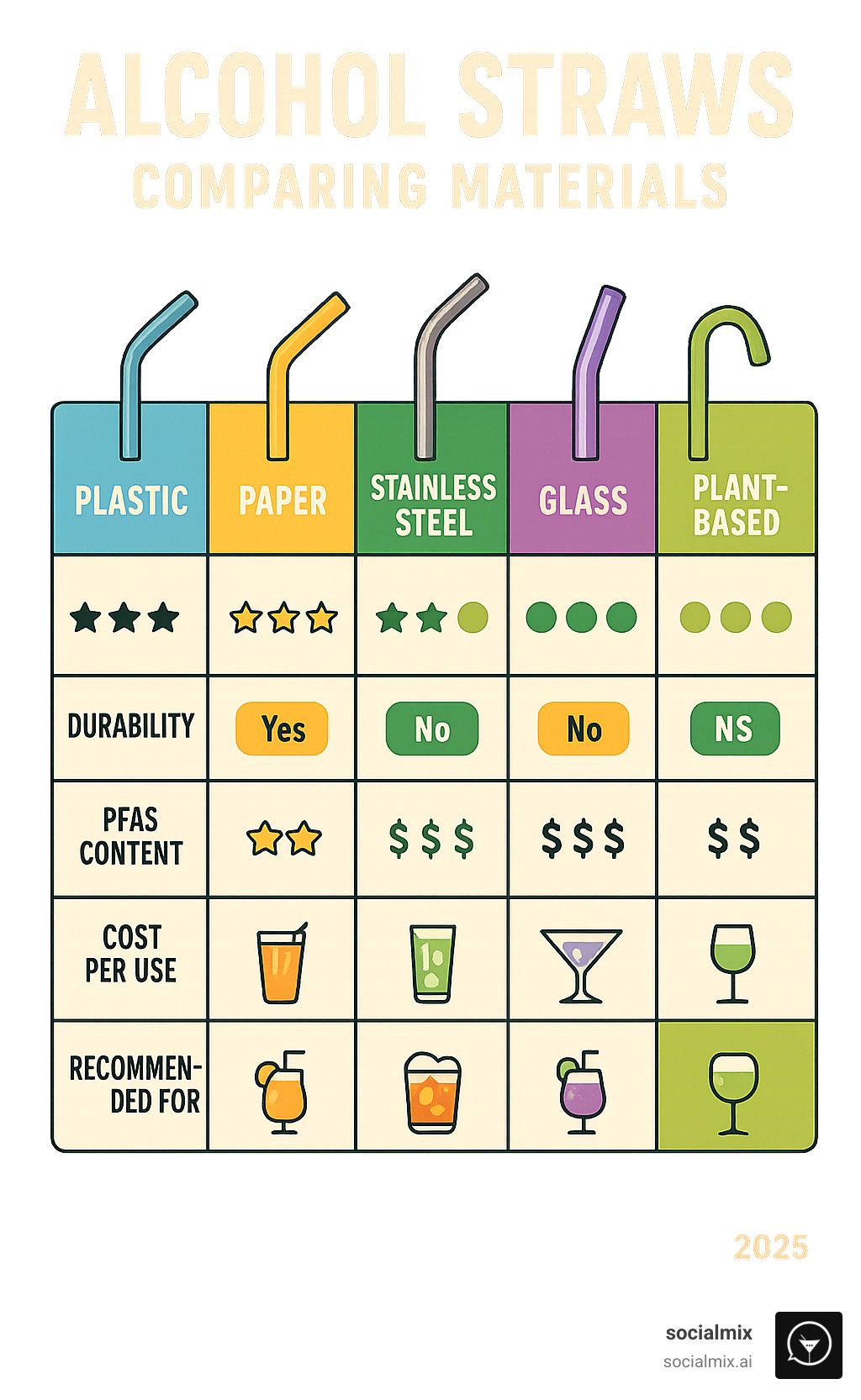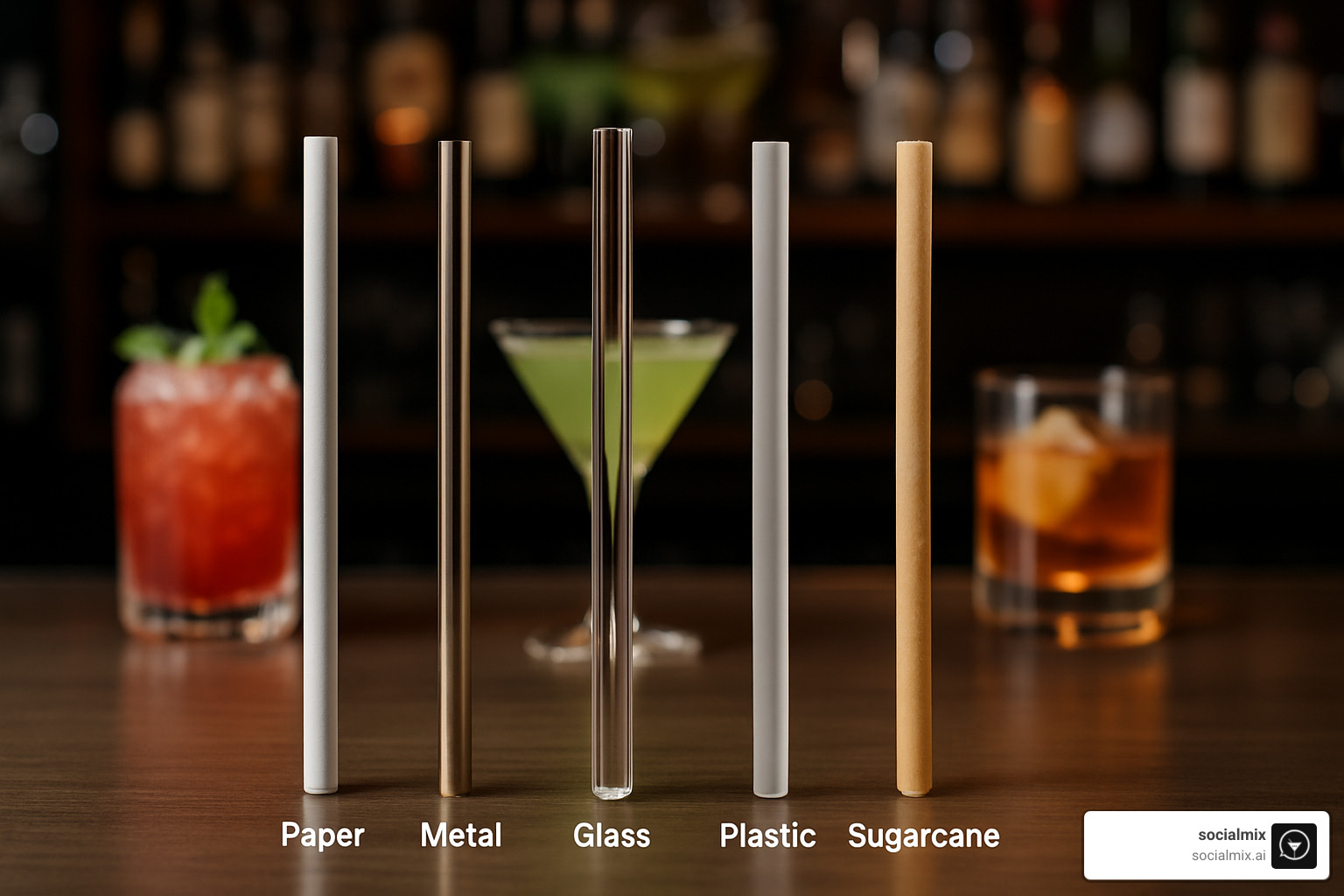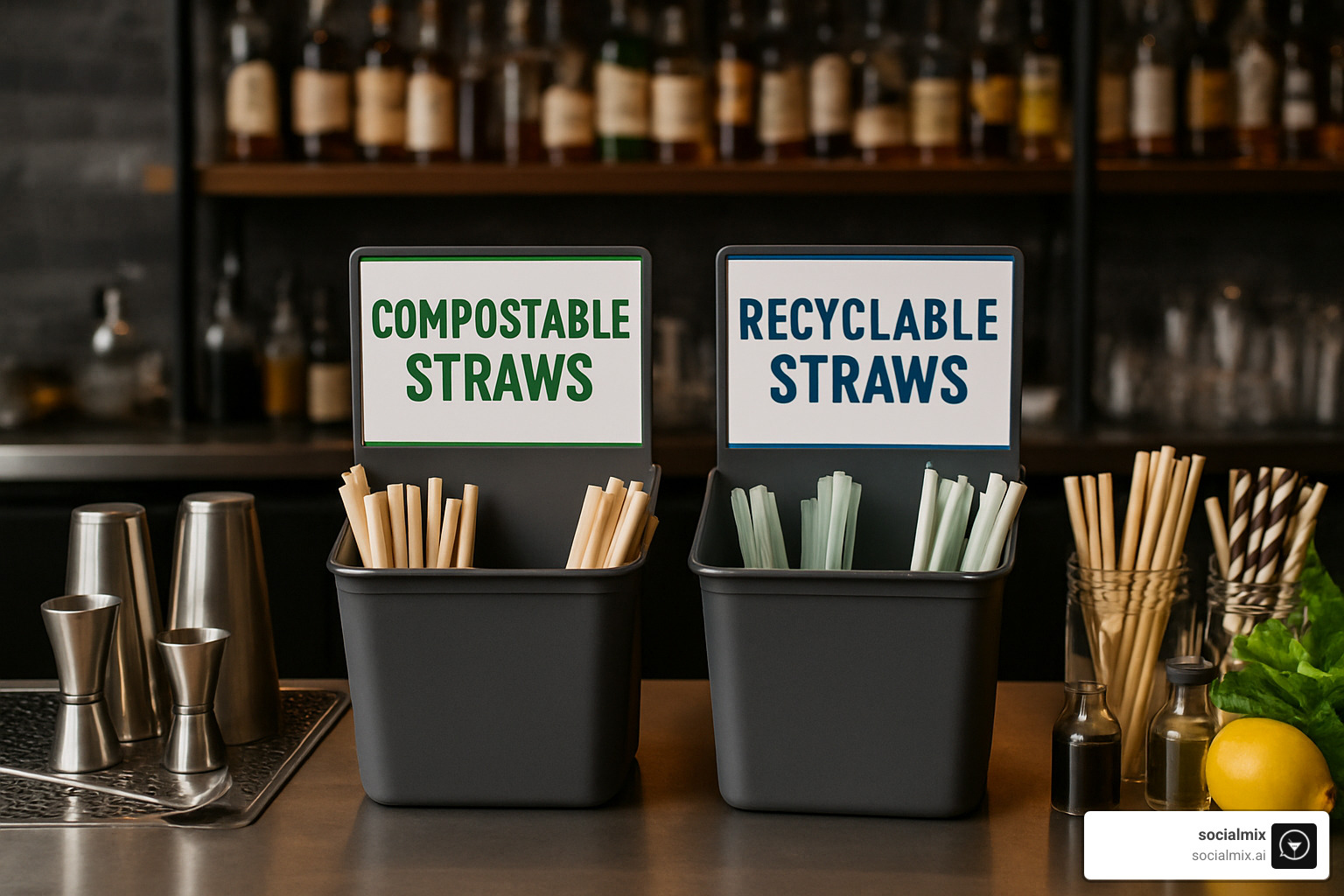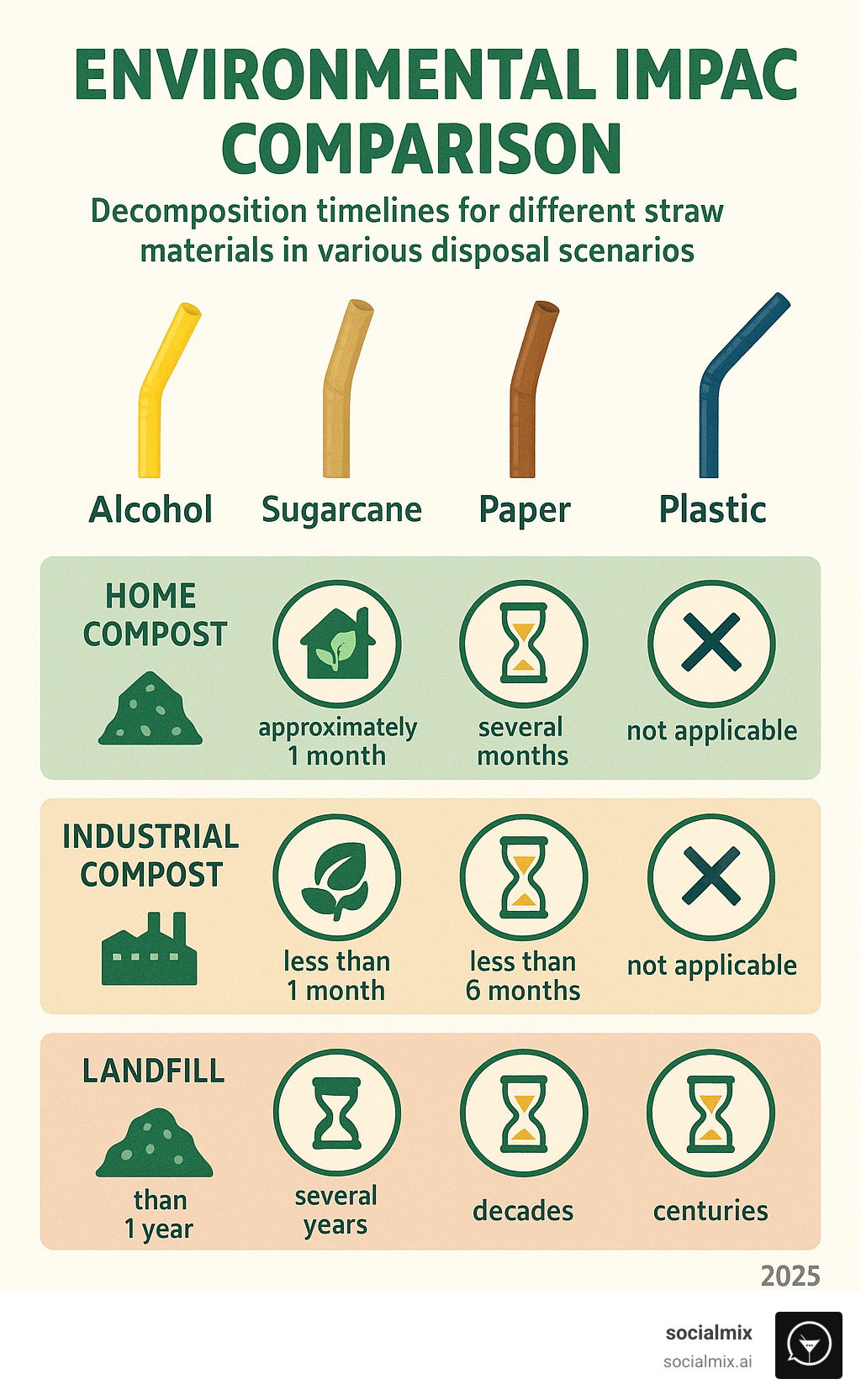Drink Smarter, Not Harder with These Alcohol Straws

Why Alcohol Straws Matter for Modern Bartenders
Alcohol straws have become essential tools for bartenders and hosts who want to lift the drinking experience while staying eco-conscious. These specialized drinking straws are designed to handle everything from delicate cocktails to thick milkshake-style drinks without compromising flavor or safety.
Top Alcohol Straw Options by Material:
- Stainless Steel - PFAS-free, lifetime warranty, dishwasher safe
- Borosilicate Glass - Heat resistant, crystal clear, premium feel
- Sugarcane Fiber - 100% compostable, soggy-resistant, plant-based
- PFAS-Free Paper - Single-use, BPI certified, bulk pricing
- PHA Bioplastic - Plastic-like performance, fully biodegradable
The choice of straw material can dramatically impact your cocktail service. A Belgian study found that 90% of paper straw brands contained PFAS chemicals, while stainless steel straws tested completely clean. Meanwhile, companies like GlassSipper have sold over 100,000 reusable glass straws since 2014, preventing more than a million plastic straws from entering landfills.
Whether you're running a high-end cocktail bar or hosting friends at home, the right alcohol straws improve both the drinking experience and your environmental impact. From temperature control to flavor preservation, these tools do more than just look good in your drink.

Alcohol Straws 101: Sip Science & Style
There's more to alcohol straws than meets the eye. These aren't just simple tubes – they're precision tools that can completely change how your cocktails taste and feel. When you sip through a straw, you're actually controlling where the liquid hits your tongue first, which can make flavors pop in ways you never expected.
The science gets pretty cool here. Temperature control becomes your secret weapon when you're using straws with cocktails. That Moscow mule stays perfectly chilled from glass to mouth, while your hot toddy maintains its warmth without burning your lips. The straw acts like a temperature highway, delivering your drink exactly as the bartender intended.
But let's be honest – half the fun is just having fun. Alcohol straws turn every drink into a bit of an event. Your guests start playing with their cocktails, creating those perfect Instagram moments, and suddenly everyone's more relaxed. For bartenders, there's a bonus: straws are way more hygienic than having everyone's lips directly on glassware.
Here's where things get interesting with mouth-feel. Different materials create completely different drinking experiences:
| Material | Best For | Mouth Feel | Temperature |
|---|---|---|---|
| Glass | Whiskey cocktails | Smooth, neutral | Excellent heat retention |
| Steel | Moscow mules | Cool, metallic | Superior temperature control |
| Paper | Rum punches | Soft, familiar | Good insulation |
| Sugarcane | Tropical drinks | Natural texture | Moderate insulation |
Glass straws feel luxurious and let you taste pure flavor. Stainless steel keeps things extra cold but adds a slight metallic touch that some people love with certain cocktails. Paper straws feel familiar and soft, while sugarcane options have this interesting natural texture that works perfectly with tropical drinks.
Are Alcohol Straws Safe?
Safety matters, especially when we're talking about what goes in our drinks. The biggest concern lately has been PFAS contamination – those "forever chemicals" that stick around way too long. That Belgian study we mentioned found PFAS in 90% of paper straw brands tested, while stainless steel straws came back completely clean.
Glass breakage is another real consideration. Yes, borosilicate glass straws are incredibly tough, but accidents happen. Companies like GlassSipper use the strongest glass available and offer lifetime warranties, but you still need to handle them with care. Store them properly and maybe skip them for outdoor parties where things get rowdy.
Metal straws take a little getting used to. Nobody wants to chip a tooth on their cocktail straw. The trick is choosing ones with smooth, rounded edges and maybe starting with bent designs that naturally angle away from your teeth. After a few drinks, it becomes second nature.
For plastic options, always check for BPA-free certification. The newer PHA alternatives are game-changers – they work exactly like plastic but break down completely in industrial composting. Uline's PHA straws cost about $20 for 375 pieces and perform just like traditional plastic without the environmental guilt.
Don't forget about cleaning tools. Reusable straws need proper cleaning to stay safe. Most quality brands include specialized brushes, and IKEA's LUFTTÄT set comes with everything you need to keep things hygienic.
Choosing Alcohol Straws for Your Bar
Getting the right alcohol straws for your bar means matching the straw to the drink. A thin martini needs a different approach than a thick mudslide, and getting this wrong can frustrate customers fast.
Diameter matters more than you'd think. Thin cocktails like martinis and cosmos work best with 6mm diameter straws – anything bigger feels awkward. Standard mixed drinks need 8mm diameter for the perfect flow rate. Thick cocktails like mudslides or frozen margaritas require 10-12mm to actually work, while bubble tea cocktails need the full 12-15mm treatment.
Branding opportunities are huge with custom straws. Companies like Strawkings pump out 45-60 million paper straws monthly with custom colors, logos, and messaging. Your branded straws become conversation starters and end up in social media posts, giving you marketing value beyond just function.
Cost-per-use calculations tell the real story. Reusable glass or steel straws cost around $6.99 for a set upfront, but then you're done buying. Single-use options like Aardvark paper straws run about $0.09 each, so the math is pretty straightforward based on your volume. High-volume bars might prefer reusables, while event spaces might stick with single-use for simplicity.
The Ultimate Roundup: Best Alcohol Straws by Material

Choosing the right alcohol straws for your bar setup feels overwhelming with so many options available. After testing materials across five main categories, we've found that each type serves different needs - from budget-conscious single-use solutions to premium reusable options that make a statement.
The durability spectrum runs from single-use paper straws that last one drink to stainless steel options with lifetime warranties. Meanwhile, compostability has become the deciding factor for many bartenders as cities implement stricter waste regulations.
Top performing brands include BarConic and Uline for plastic alternatives, Aardvark and Strawkings for paper options, Straws.no and IKEA LUFTTÄT for metal choices, GlassSipper for glass varieties, and SugarcaneStraw.com plus Strawlink for plant-based solutions.
Understanding reusability versus disposal convenience helps narrow your choice. Reusable glass and stainless steel straws eliminate ongoing purchasing costs, while single-use alternatives offer grab-and-go convenience for busy service periods.
Plastic & PHA Picks
BarConic stands out in the plastic category with their comprehensive selection and direct-from-manufacturer pricing. Their range spans from $1.99 starter packs to $79.95 bulk quantities, making them accessible for both home bartenders and commercial operations.
What impressed us most was their attention to health department compliance. Both wrapped and unwrapped versions meet varying local requirements, which saves headaches when regulations differ between locations.
For environmentally conscious bars wanting plastic performance, Uline's PHA straws represent a game-changer. At $20 per 375-piece box, these bioplastic straws feel identical to traditional plastic while remaining fully compostable. They're particularly valuable in cities with plastic straw bans but high-volume cocktail service.
The FDA food-grade certification on both brands provides peace of mind for commercial use. Single-use compliance matters when serving alcohol, and these options meet all safety standards without compromising performance.
Paper Done Right (PFAS-Free)
The PFAS contamination issue has made paper straw selection tricky, but several manufacturers have stepped up with cleaner alternatives. Aardvark paper straws lead the pack with their "strongest on the market" claim, available through Uline at $37 per 400-piece box.
Tetra Pak's FSC-certified options integrate beautifully with their broader packaging ecosystem. Bars can actually recycle these straws alongside beverage cartons, creating true circular economy benefits that look great in sustainability reports.
Strawkings takes customization seriously, producing 45-60 million straws monthly with extensive branding options. Their FDA and EU SGS certifications provide international compliance - perfect for chains or franchises operating across borders.
Soggy-resistance remains the make-or-break factor for paper alcohol straws. The best options maintain structural integrity for 30+ minutes in cold cocktails, though hot drinks still present challenges for paper construction.
Stainless & Copper Keepers
Straws.no offers neat reusable options at around $9-10 USD each, emphasizing style alongside sustainability. Their gold and silver finishes complement upscale cocktail presentations, especially effective for signature drinks or premium service tiers.
IKEA's LUFTTÄT set provides exceptional value at $6.99 for four straws plus cleaning brush. Customer reviews consistently praise the included brush and dishwasher compatibility, though some mention an adjustment period for the metal mouth-feel.
BarConic's copper-plated curved straws target bartenders seeking premium presentation tools. The copper plating provides natural antimicrobial properties while creating distinctive visual appeal - particularly stunning for Moscow mules and other copper-served cocktails.
The lifetime use economics become compelling quickly for regular users. Even at premium pricing, cost-per-use drops below single-use alternatives within months for active bars.
Crystal-Clear Glass Alcohol Straws
GlassSipper dominates the glass market with over 100,000 units sold since 2014. Their borosilicate construction handles both hot and cold beverages, backed by lifetime warranties that demonstrate real confidence in durability.
The environmental impact numbers are impressive: preventing over one million plastic straws from entering landfills and oceans. For bars prioritizing sustainability messaging, these statistics provide compelling talking points with environmentally conscious customers.
Borosilicate glass offers the cleanest taste experience available. Zero flavor transfer and excellent temperature retention showcase cocktail colors beautifully, particularly important for layered drinks or colorful presentations.
Dishwasher safety simplifies maintenance in commercial settings, though hand-washing with provided brushes extends lifespan and prevents potential breakage from dishwasher jostling.
Plant-Based Heroes: Sugarcane & Wheat
SugarcaneStraw.com has created the most certified plant-based option available, with 15 active certifications including OK Compost Home approval. Their sugarcane bagasse construction repurposes agricultural waste that would otherwise be incinerated or landfilled.
The company offers two versions: V1 uses sugarcane bagasse with PLA binders, while V2 eliminates PLA entirely for completely plant-based construction. Both versions resist sogginess significantly better than paper alternatives while maintaining full compostability.
Strawlink specializes in wheat straws, founded in 2019 as biodegradable alternatives gained momentum. While smaller than sugarcane operations, wheat straws offer unique natural aesthetics that complement rustic or farm-to-table establishments.
The natural aesthetics distinguish plant-based straws from manufactured alternatives. Visible fiber patterns and slightly irregular shapes add organic character to cocktail presentations, particularly effective for craft cocktails emphasizing natural ingredients.
Regulations, Trends & Responsible Service

The world of alcohol straws is changing fast, and if you're running a bar or hosting events, staying ahead of these changes isn't just smart business - it's essential for compliance and customer satisfaction.
Plastic straw bans have swept across countless cities and states, creating a patchwork of regulations that can make your head spin. Meanwhile, the recent bombshell about PFAS contamination has turned the paper straw industry upside down. Scientific research on PFAS in paper straws revealed that 90% of paper brands contain these "forever chemicals," while stainless steel options test completely clean.
This findy has bartenders and bar owners scrambling to reconsider their straw strategies. What seemed like the obvious eco-friendly choice suddenly became more complicated.
Beyond safety concerns, customization has become the hottest trend in the alcohol straw market. Bars are treating straws as branding opportunities, with custom logos, color matching, and themed designs becoming standard offerings. Some establishments are even experimenting with sensory straws - like textured surfaces or unique hole patterns that change how drinks feel in your mouth.
The innovation doesn't stop there. Size specialization has created straws designed specifically for different cocktail types, while sustainability certifications help establishments prove their environmental commitments to increasingly conscious customers.
Alcohol Straws & Local Eco-Mandates
Navigating local regulations can feel like learning a new language, especially when every city seems to have different rules. California's plastic restrictions affect any establishment serving alcohol, while cities like Seattle have gone all-in with comprehensive single-use plastic bans.
The tricky part? Wrapped straw rules vary dramatically depending on where you operate. Some health departments insist on individual wrapping for hygiene reasons, while others happily accept bulk dispensing from covered containers. Getting this wrong can mean fines, failed inspections, or worse - unhappy customers.
Health department codes are also evolving to address straw storage and dispensing. Clean, covered storage containers have become the bare minimum, and some jurisdictions now specify maximum exposure times for unwrapped straws. It's worth checking with your local health department before making major straw purchases.
Best Practices to Serve Safely with Alcohol Straws
Here's something interesting: alcohol straws can actually support responsible service practices. The controlled flow rate naturally slows consumption and encourages smaller sips, which can help prevent overconsumption while keeping the social atmosphere intact.
When you're hosting or serving, responsible service goes far beyond straw selection. Tips for hosting a safe holiday gathering emphasize the importance of confirming transportation plans and providing appealing non-alcoholic alternatives. Quality straws can make both alcoholic and non-alcoholic drinks look equally appealing, ensuring all guests feel included.
The biological pacing that comes with straw use creates natural portion control. This isn't about restricting fun - it's about extending it safely. Transportation verification becomes crucial, whether that means confirming designated drivers or helping guests arrange ride-shares.
Don't forget the power of substantial food service to slow alcohol absorption, and remember that only time sobers someone up. As the host or bartender, limiting your own consumption sets the right tone for responsible enjoyment.
Creating appealing non-alcoholic options with the same attention to presentation - including quality straws - ensures everyone can participate in the experience. After all, great hospitality is about making every guest feel special, regardless of what they're drinking.
Frequently Asked Questions about Alcohol Straws
Do alcohol straws change the taste of my cocktail?
Here's something that might surprise you: the material of your alcohol straws absolutely affects how your cocktail tastes. It's not just in your head - there's real science behind this.
Glass and stainless steel straws give you the cleanest taste experience. They're completely neutral, letting your carefully crafted cocktail shine without any interference. Think of them as the clear window that lets you see the view without distortion.
Paper straws tell a different story. As they start to soften (which happens faster than we'd like), they can add subtle papery notes to your drink. It's not terrible, but it's definitely noticeable if you're paying attention.
Plastic straws might contribute a tiny bit of flavor, though quality options keep this to a minimum. The bigger concern with plastic is often what chemicals might be leaching rather than taste itself.
Here's where it gets interesting: sugarcane and wheat straws actually add subtle natural flavors that can complement certain cocktails. A wheat straw in a farm-to-table inspired cocktail? That's not a bug, it's a feature.
The trick is matching your straw to your drink. Save the neutral materials for complex cocktails where every flavor note matters. Use natural materials for simpler drinks where a hint of earthiness might actually improve the experience.
Which alcohol straw material is safest for guests?
Based on everything we know right now, stainless steel straws win the safety game hands down. They contain zero PFAS chemicals, don't need chemical processing to work properly, and eliminate all the waste concerns that come with single-use options.
Glass straws offer similar safety benefits with that premium feel, but they do require more careful handling. Nobody wants to deal with broken glass during a party.
For single-use situations, your best bets are PFAS-free paper straws or PHA bioplastic options. The key word here is "certified" - always check for proper certifications and avoid anything that's unmarked or looks questionable.
Belgian study we mentioned earlier? Finding PFAS chemicals in 90% of paper straw brands while stainless steel tested completely clean really changed how we think about "safe" options. It's worth investing in quality when it comes to what your guests are putting in their mouths.
How should I dispose of biodegradable alcohol straws properly?
This is where things get a bit complicated, because proper disposal really depends on what's available in your area. Not all "biodegradable" straws can be disposed of the same way.
Sugarcane straws with home composting certification can actually go right in your backyard compost bin. They'll break down alongside your kitchen scraps and garden waste. It's pretty satisfying to know your party supplies are feeding next year's tomatoes.
Paper straws should go in compost bins where available, but regular trash is fine if your area doesn't have industrial composting. Just never put them in recycling bins - they'll contaminate the recycling stream and cause more problems than they solve.
PHA straws need industrial composting facilities to break down properly. These aren't available everywhere yet, so check with your waste management company first. If industrial composting isn't available in your area, regular trash is the next best option.
The bottom line? When in doubt, contact your local waste management provider. They'll know exactly what facilities are available and how to handle different materials properly.

Conclusion
Choosing the right alcohol straws transforms both environmental impact and customer experience. Whether you prioritize the lifetime durability of stainless steel, the crystal clarity of borosilicate glass, or the complete compostability of sugarcane fiber, material selection matters more than most realize.
The research is clear: not all eco-friendly claims are equal. With 90% of paper straws containing PFAS chemicals while stainless steel options test completely clean, informed material choices protect both guest health and environmental goals.
For bars and restaurants, the right straws become part of the complete service experience. At socialmix, we understand how thoughtful details lift social gatherings and create memorable moments. Quality alcohol straws represent one more way to show guests that every aspect of their experience matters.
The future points toward reusable and truly biodegradable options as regulations tighten and consumer awareness grows. Whether you choose the elegance of glass, the durability of steel, or the sustainability of plant-based materials, investing in quality straws pays dividends in customer satisfaction and environmental responsibility.
Ready to explore more ways to improve your drinking experience? Check out our guide to essential drinking accessories for comprehensive recommendations on elevating every aspect of cocktail service.




Leave a comment